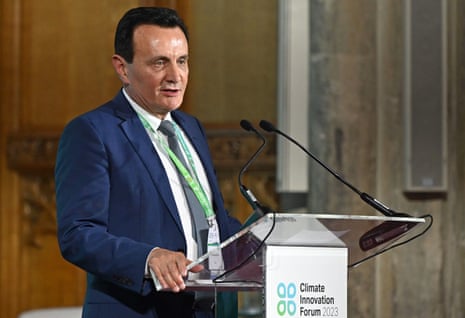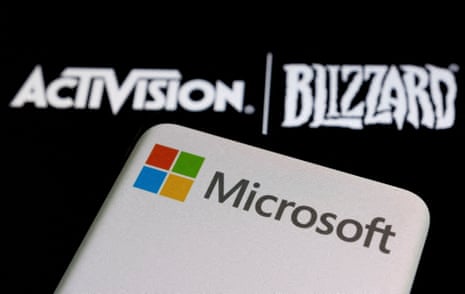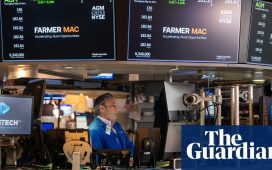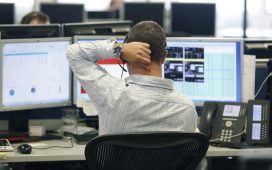
Rupert Neate
The bosses of the UK’s 100 biggest listed companies collected an average £500,000 pay rise last year, while many of the millions of people working for them saw their pay growth fail to keep up with soaring inflation, our wealth correspondent Rupert Neate writes.
FTSE 100 chief executives received an average pay rise of 16% last year, taking their median pay to £3.9m, up from £3.4m in 2021, according to research by the High Pay Centre thinktank published on Tuesday.
Pascal Soriot, the CEO of the drug company AstraZeneca, was the highest paid last year, collecting £15.3m, up from £13.9m the previous year.

Charles Woodburn, the boss of the arms manufacturer BAE Systems, was the second highest paid, collecting £10.7m. In third place was Albert Manifold, the leader of the building supplies company CRH, who was paid £10.4m.
The bosses of the oil and gas companies BP and Shell were also among the top earners. The BP chief executive, Bernard Looney, was paid just over £10m, while Shell’s former CEO Ben van Beurden was paid £9.7m.
The median FTSE 100 CEO is now paid 118 times the median UK full-time worker, an increase from 108 times in 2021 and 79 times in 2020. The average salary for full-time UK workers is £33,000, according to Office for National Statistics figures.
Luke Hildyard, the director of the High Pay Centre, said:
At a time when so many households are struggling with living costs, an economic model that prioritises a half-a-million-pound pay rise for executives who are already multimillionaires is surely going wrong somewhere.
How major employers distribute the wealth that their workforce creates has a big impact on people’s living standards. We need to give workers more voice on company boards, strengthen trade union rights and enable low- and middle- income earners to get a fairer share in relation to those at the top.
Key events
Ministers who are concerned about the impact that high wages are having on UK inflation, should curb pay for the top earners, the GMB union has said.
Commenting on the High Pay Centre’s FTSE 100 pay review this year, Gary Smith, GMB general secretary, said:
Throughout 2022, working people across the UK were desperately struggling with the cost of living crisis.
Meanwhile fat cat CEO pay sky rocketed to an average of almost £4million – more than 100 times that of the average worker. While workers in sectors across the board were forced onto picket lines to make ends meet, these top brass were trousering fortunes.
If ministers genuinely think high wages are going to cause spiralling inflation, they probably need to think about curbing pay at the top of the tree, rather than everyone else.
UK borrows £4.3bn, less than expected in July: ONS
Government net borrowing came in at £4.3bn last month, according to the Office for National Statistics.
The figure – which measures the difference between spending and income from taxes – is lower than the £5bn that economists had forecast.
It has raised speculation that chancellor Jeremy Hunt could cut taxes ahead of the 2024 election to give the Tory party a bit of a boost.
However, rising interest rates took their toll, pushing interest costs up £1.5bn and taking total interest payments to £7.7bn. That is the highest amount that the government has paid to cover interest bills since records began in April 1997.
Public sector net borrowing (excluding public sector banks) was £4.3 billion in July 2023, £3.4 less than in July last year.
It was the fifth-highest July borrowing since monthly records began in 1993.
➡️ https://t.co/lgjxhVRhlR pic.twitter.com/WpSIov2pPK
— Office for National Statistics (ONS) (@ONS) August 22, 2023
Overall, total net debt reached £2.6bn by the end of July, representing around 98.5% of GDP, which is 2 percentage points higher from a year earlier and is still holding at the highest levels since the 1960s.
Ruth Gregory, deputy chief UK economist at Capital Economics said the chancellor could be afforded less room to manoeuvre than the figures might suggest.
First, if we are right in expecting the economy to weaken later this year, tax receipts will probably disappoint. While the OBR’s forecasts are based on GDP growth of 0.2% and 2.1% in 2023/24 and 2024/25 respectively, we expect growth of just 0.1% and 0.8%.
Second, the increase in market rate expectations and rise in longer-dated gilt yields since March will probably add something like £18bn to the OBR’s forecast for debt interest spending by 2027/28.
As a result, we still think the chancellor will have little room to unveil large-scale permanent tax cuts and/or spending rises in the Autumn Statement without jeopardising his fiscal rules.
European stocks are broadly higher this morning, with investors boosting some tech shares ahead of an earnings update from US chipmaker Nvidia later this afternoon.
Microsoft submits new Activision Blizzard deal to UK regulator

Jasper Jolly
Microsoft has filed changes to its proposed takeover of the video game maker Activision Blizzard, in a bid to win over the UK competition watchdog which previously blocked the $69bn (£54bn) deal, my colleague Jasper Jolly writes.
The Competition and Markets Authority (CMA) on Tuesday said it would investigate the new proposals, under which Microsoft will not acquire cloud rights outside Europe for existing Activision desktop computer and console games, or for new games released by the developer during the next 15 years.
The move revives the US tech company’s hopes of completing the takeover of the owner of hit titles such as Call of Duty, World of Warcraft and Candy Crush after the CMA in April blocked it, citing concerns it could allow the company to dominate the nascent cloud gaming market.

However, the UK regulator had appeared increasingly isolated after its EU counterparts passed the deal and the US competition regulator lost a court request to block it.
The CMA said that, under the new deal presented to regulators, the rights to Activision’s games outside the European Economic Area will be divested to the rival developer Ubisoft prior to Microsoft’s acquisition.
Sarah Cardell, the CMA chief executive, said the deal did not yet have a “green light” to proceed and its goals had not changed.
The CMA has today confirmed that Microsoft’s acquisition of Activision, as originally proposed, cannot proceed.
Read more here:
The top paid FTSE 100 CEOs last year were:
-
AstraZeneca CEO Pascal Soriot: £15.3m
-
BAE Systems CEO Charles Woodburn: £10.7m
-
CRH CEO Albert Manifold: £10.4m
-
BP CEO Bernard Looney: £10m
-
Experian CEO Brian Cassin: £9.9m
-
Shell CEO Ben van Beurden: £9.7m
-
British American Tobacco CEO Jack Bowles: £9.6m
-
Anglo American CEOs Mark Cutifani/Ducan Wanblad: £9.5m
-
Endeavour Mining CEO Sebastien de Montessus: £9m
-
GSK CEO Emma Walmsley: £8.5m

Rupert Neate
The bosses of the UK’s 100 biggest listed companies collected an average £500,000 pay rise last year, while many of the millions of people working for them saw their pay growth fail to keep up with soaring inflation, our wealth correspondent Rupert Neate writes.
FTSE 100 chief executives received an average pay rise of 16% last year, taking their median pay to £3.9m, up from £3.4m in 2021, according to research by the High Pay Centre thinktank published on Tuesday.
Pascal Soriot, the CEO of the drug company AstraZeneca, was the highest paid last year, collecting £15.3m, up from £13.9m the previous year.

Charles Woodburn, the boss of the arms manufacturer BAE Systems, was the second highest paid, collecting £10.7m. In third place was Albert Manifold, the leader of the building supplies company CRH, who was paid £10.4m.
The bosses of the oil and gas companies BP and Shell were also among the top earners. The BP chief executive, Bernard Looney, was paid just over £10m, while Shell’s former CEO Ben van Beurden was paid £9.7m.
The median FTSE 100 CEO is now paid 118 times the median UK full-time worker, an increase from 108 times in 2021 and 79 times in 2020. The average salary for full-time UK workers is £33,000, according to Office for National Statistics figures.
Luke Hildyard, the director of the High Pay Centre, said:
At a time when so many households are struggling with living costs, an economic model that prioritises a half-a-million-pound pay rise for executives who are already multimillionaires is surely going wrong somewhere.
How major employers distribute the wealth that their workforce creates has a big impact on people’s living standards. We need to give workers more voice on company boards, strengthen trade union rights and enable low- and middle- income earners to get a fairer share in relation to those at the top.
Introduction: FTSE 100 CEOs snag 16% average pay rise, taking typical pay to £3.9m
Good morning, and welcome to our rolling coverage of business, the financial markets and the world economy.
There’s buzz this morning about new figures released from the High Pay Centre thinktank, which show that – on average – FTSE 100 CEOs took home an extra £500,000 last year.
The average 16% pay rise took typical salaries to £3.9m compared to £3.4m a year earlier. It marks the highest pay levels since 2017, when average CEO pay reached £3.97m, but later dipped during the Covid crisis.
New @HighPayCentre research out today – CEOs of Britain’s biggest companies enjoyed a £500k payrise last year https://t.co/IBt0Wx6Sti
Median pay for FTSE 100 CEOs was £3.9m in 2022, up from £3.4m. FTSE 350 firms spent a total of £1.3bn on pay of 570 executives
— Luke Hildyard (@lukehildyard) August 22, 2023
That compares the £33,000 salary earned by the average worker, who has also been squeezed by rising prices during the cost of living crisis.
Regular pay growth, which excludes bonuses, reached 7.8% over the three months to June, but actually fell to 0.6% once inflation was taken into account. The UK’s rate of inflation recently eased to 6.8% in July, but peaked at 11.1% in October.
The new figures have raised fresh concerns about levels of inequality across the UK.
Paul Nowak, the general secretary of the Trades Union Congress, said:
While millions of families have seen their budgets shredded by the cost of living crisis, City directors have enjoyed bumper pay rises.
This is why workers must be given seats on company boards to inject some much-needed common sense and restraint. We need an economy that delivers better living standards for all – not just those at the top.
But under the Tories, Britain has become a land of gross extremes. As households across the country have struggled to put food on the table, sales of Porsches have hit record levels.












